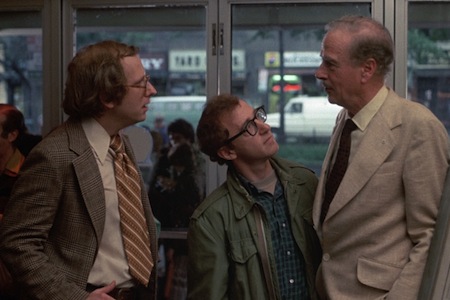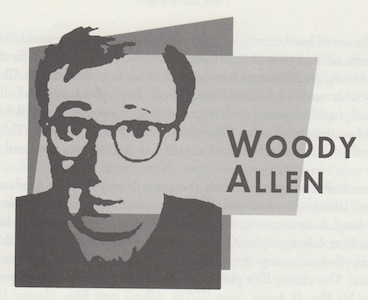
Born: December 1, 1935, Brooklyn, NY
I’ve always tried to dissuade people and tell them my films are not all autobiographical.
—Woody Allen
Woody Allen made movies smarter. He also made them funnier, but his gift for appealing to the intellect of moviegoers has had a lasting effect on the way scripts are written today. He wasn’t just an intellectual’s filmmaker, he was a filmmaker for anyone who liked the clever, the inventive or the unexpected delivery of dialogue. His scripts introduced humor that referenced popular culture and borrowed elements of absurdity and fantasy from such far-ranging influences as Groucho and Fellini. He respected the collective literacy of the audiences and raised the standard for both comedies and dramas.
In the earliest days of television, Woody Allen was a gag writer for the immensely popular Your Show of Shows with Sid Caesar. Among his fellow writers were the cream of the comedy crop: Neil Simon, Mel Brooks and M*A*S*H creator Larry Gelbart. After selling monologue jokes to a receptive Ed Sullivan in 1961, Allen felt his material might do well in Greenwich Village nightclubs, where standup comics were developing acts for humorous record albums. He spent his weeknights perfecting his timing and delivery in New York comedy clubs. Striking a chord with intellectuals, he created a style of humor that exorcised his fascination with death, sex and violence, the same subjects that were on the minds of his audience.
Editor’s note: The essays of Scott Smith’s 1998 book, The Film 100, are being republished in their entirety here on Keyframe, not as the last word on cinema, but as a starting point for further discussion. Please join the conversation. To view the entire Film 100 list and find links to all the essays, please visit Reintroducing the Film 100.
The success of his routines led to several Broadway plays, small film acting assignments and screenwriting stints before the first two films he directed, Take the Money and Run and Bananas (1971), demonstrated that Allen had a sense for what audiences would find funny. Both films, in which he wrote and starred, had fast-paced and inventive gags reminiscent of Allen’s movie heroes, who include Charlie Chaplin and the Marx Brothers. These films introduced jokes that referenced social and political figures and current events.
Using cultural images in much the same way Jean-Luc Godard did in Breathless (1959), Allen had established the postmodern comedy. He seemed to be winking at moviegoers, sharing in their awareness of all that had come before in film history. Like Godard, Allen would make a film tribute to Humphrey Bogart, using the public’s familiarity with his role as Rick in Casablanca. The classic film played a pivotal part in the adaptation of Allen’s Broadway hit Play It Again, Sam (1972). Allen’s next film, Sleeper (1973), is another homage, this time to Buster Keaton’s deadpan reaction to the unpredictability of mechanical objects. He would go on to show his reverence for directors Ingmar Bergman in Interiors (1978), Another Woman (1988) and September (1987) and Federico Fellini in Stardust Memories (1980) and Shadows and Fog (1992). Many of these films are open testaments of his devotion to these literary and artistic influences.
By the time Allen had finished Love and Death (1975), his screwball offerings had lost much of their novelty, and many of the sight gags seemed more like television sketch comedy. But the introspective and bittersweet Annie Hall (1977) established a new brand of comedy, mixing sophisticated humor and experimental narrative structures. Annie Hall was a fresh and vital film. During scenes of dialogue with other characters, Allen would suddenly turn to the camera and address the audience, much as he did in standup performances. During an on-screen dispute about a literary classic, Allen would drag the real-life author into the scene and have him settle the argument. The film used flashbacks, animated sequences, discontinuous chronology, subtitles and interior monologues to reinforce the soul-searching theme. The nebbish “Woody” persona, created over a number of films, now had a more relaxed and reflective quality, mirroring the spirit of the 1970s “me” generation. A quintessential satire on the psychoanalytical intellectual, Annie Hall proved to be an overwhelming success and won four Oscars.
Other filmmakers, including Paul Mazursky, Elaine May and Richard Benjamin, followed in Allen’s footsteps, making smarter and more self-aware comedies. A flood of standup comedians entered the film industry on the heels of Allen’s success. Steve Martin, Harold Ramis, Richard Pryor, Amy Heckerling and Albert Brooks all climbed the ranks from comic to screenwriter to director.
Annie Hall began a new era for Allen. Teaming with long-term collaborators, talented ensemble casts and studios willing to give him limitless freedom, Allen has added unique creative touches to a long list of distinguished films, including Manhattan (1979), Hannah and Her Sisters (1986) and Crimes and Misdemeanors (1989). His finest films feel autobiographical and balance Allen’s traditional Yiddish humor with a universal depth and insight. Somewhere in between his best and worst are the entertaining films Zelig (1983), Broadway Danny Rose (1984) and The Purple Rose of Cairo (1985).
Movies made today, even the most mundane action thrillers and cop dramas, owe Woody Allen at least a small debt, for their humor now has to be smart. His irreverent intellectual comedies since Annie Hall have almost single-handedly killed off the slapstick comedy, and physical comedians like Chevy Chase, Robin Williams and Jim Carrey now succeed only by blending their madcap antics with the smart retort.
To read all the republished articles from ‘The Film 100,’ go to Reintroducing the Film 100 here on Keyframe.




